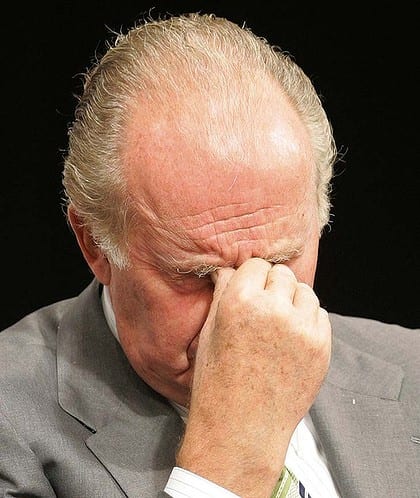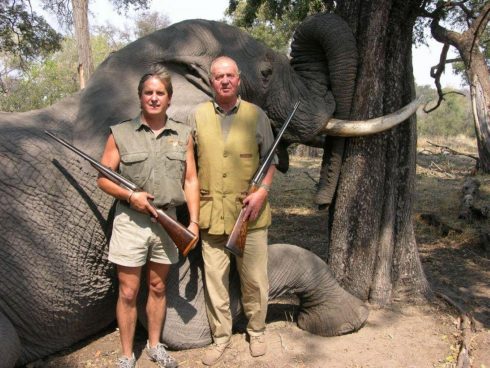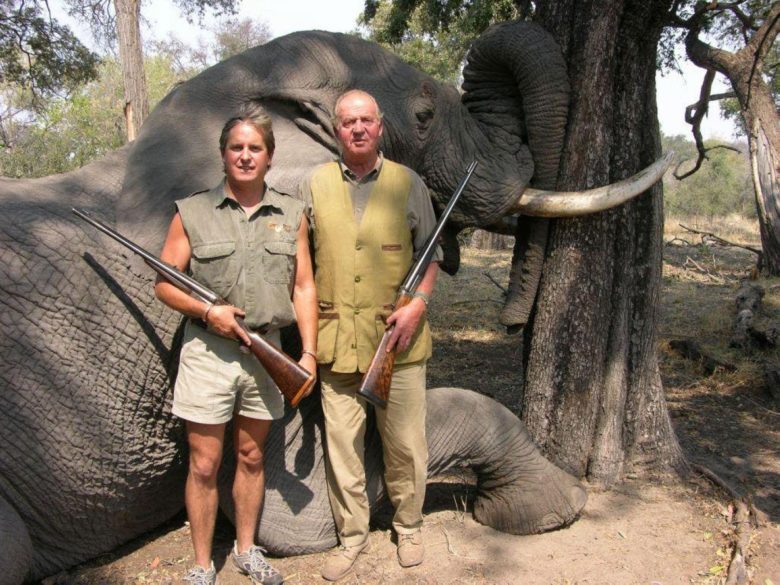YOU aren’t really the king of Spain until you’ve been exiled.
Alfonso XIII slunk off in the shadows in 1931 after failing to implement a constitutional regime. Now, like his grandfather before him, Juan Carlos has fled the country in disgrace following allegations of financial corruption.
Accused of accepting a multi-million euro bribe from Saudia Arabia’s late King Abdullah in exchange for a high-speed rail contract, the runaway royal was sighted touching down in Abu Dhabi last week (August 8) with not even his wife at his side.
In a letter to his son, King Felipe VI, Juan Carlos wrote that he had quit Spain due to the ‘public repercussions of certain episodes of my past private life’. One episode being the huge sum of money he reportedly transferred to his mistress Corinna Sayn-Wittgenstein in an attempt to hide his railroad commission from authorities. Meanwhile, every animal lover in the entire world has heard about his hypocritical hunting trip to shoot elephants while Honorary President of the World Wildlife Fund.
Born in exile in Rome in 1938, Juan Carlos was only 12 months old when General Francisco Franco defeated the Second Republic of Spain in the Spanish Civil War and began his 36 year dictatorship.

Like Simba to Pride Rock in The Lion King, the boy returned to his kingdom aged 10 as part of a covert plan to restore the monarchy in Spain. Dictator Franco took Juan Carlos as a royal hostage and governed the child’s life for just under two decades. But the allegiance proved advantageous when Franco named the prince his successor in 1969. Unlike his adviser, Carlos favoured reforms and quickly took apart the authoritarian regime.
Twelve years later, Carlos publicly supported democracy amidst an attempted army coup and was praised by his subjects for derailing a return to dictatorship. The king became a symbol of unity and was fondly admired as the father of Spain’s third republic. His stock had never been so high. He was viewed as a hero for standing up to the forces of reaction and repression.
He remained popular for years, but then controversy began to follow Juan Carlos. Along with a regular smattering of dodgy financial dealings, the king had been regularly lambasted by the public for his luxury hunting trips.
In 2004, Carlos prompted significant outrage when he killed four bears – including a pregnant female – on a trip to Romania. And that wasn’t the end of his bloodthirsty hobby.
Amidst the devastating 2012 Spanish financial crisis, the king spent over 50,000 euros on a jaunt to Botswana to hunt elephants. This while he was Honorary President of the World Wide Fund for Nature, a title of which he was instantly stripped. He apologised and gave up his yacht in aid of the crisis but failed to quell the anger bubbling in the blood of the nation.

After involvement with a tax avoidance scandal alongside his daughter Cristina and her questionable husband, Iñaki Urdangarin, in 2014, tens of thousands of citizens took to the streets to demand a referendum to abolish the monarchy. Juan Carlos was forced to abdicate and pass the crown to his son Felipe VI, later officially retired from all royal duties.
From the days of glory to international embarrassment, Juan Carlos’ string of shameful sagas has sent shock waves through the once sturdy foundations of the Spanish monarchy. As the disgraced ex-king returns to the exile into which he was born, banishment appears increasingly like a royal right of passage.
Now, with anti-monarchist fervour growing in the country, King Felipe will have to do a lot more than exercise his sovereign prerogative to safeguard the future of the Spanish throne.
READ ALSO:
Click here to read more Spain News from The Olive Press.








